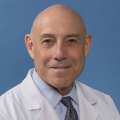As a professional baseball player, Connor Joe, 28, is used to having physical exams. He’s had so many, he can’t even give an exact number.
“I’ve had countless exams done by so many doctors,” Joe said. “It’s just normal.”
But when he was undergoing his physical as part of the Los Angeles Dodgers Spring Training program in Arizona, in 2020, this one was anything but routine. First, it was taking a lot longer than the usual 10- to 15-minute exams he was used to.
“It was actually a little bit frustrating because I wanted to get back on the field and play,” remembers Joe.
But before he could do that, the doctor recommended Joe get an ultrasound and have another doctor take a look at him.
At first, Joe didn’t really think much of it, so he went by himself to a clinic in Arizona. That’s where he got the news: testicular cancer.

“At first I was in disbelief,” said Joe. “I thought there’s no way this could happen to me. No way at my age or how I feel physically that it could happen. Up until that day, I had no symptoms. I probably had the best off-season of my life and my career. Physically, I was probably stronger than I’ve ever been and really excited to start Spring Training.”
But what Joe didn’t know was testicular cancer is one of the most common cancers in men age 20 to 40. The prevalence of this type of cancer overall, however, is pretty low. There are only about 7,500 new cases diagnosed every year in the United States.
“Generally, this type of cancer is very treatable, and in almost all cases, curable,” said Mark Litwin, MD, MPH, chair of urology at the David Geffen School of Medicine at UCLA and director of the Testicular Cancer Program at the UCLA Institute of Urologic Oncology. “With testicular cancer, because it’s of an organ that presents itself on the outside of the body, it’s very easy to diagnose early, and it’s the case with all cancers, the earlier you get diagnosed, the better the odds are on treatment and the better the odds are on a complete cure.”
After Joe’s diagnosis, he and his wife headed back to Los Angeles to get treated at UCLA Health, under the care of Dr. Litwin.
“The impact Dr. Litwin had on myself alone has been tremendous,” said Joe. “The time he’s taken with me, my wife and family to make us feel comfortable before treatment has simply been incredible. His energy is off-the-charts and infectious. The fact that he sat down with us for a couple hours to explain the game plan and make sure we felt comfortable with it was really special.”
The first part of the plan included surgery to remove the tumor, followed by a full-body scan to see if the cancer had spread to other parts of the body. The scan revealed that the cancer did metastasize into his left lung. Because it spread, Joe also would need chemotherapy.
Shortly after his surgery, Joe started several cycles of chemotherapy. He would head over to the infusion clinic for six hours a day, five days in a row. He then would get a two-week break for his body to recover and let his blood count return to normal. He did that on repeat four times.
“Chemo was tough,” said Joe. “I would come home feeling tired, fatigued and sick. But all the nurses there at the infusion clinic were amazing. They treated me so well and really cared for us as humans, not just patients.”
Even during his treatment, Joe continued to work out. He took it a bit easy, he said, but never really missed much training.

“Joe has this can-do attitude,” said Dr. Litwin, who is also a researcher at the . “When you’re in your 20s, you don’t want your name and the word cancer in the same paragraph, never mind in the same body. Be he was really terrific about it and was like, ‘All right, this is the pitch, and I’m going to hit a home run,’ and that is exactly what he’s done. And Connor is maximizing his RBI by going public and increasing awareness of testicular cancer. That will save lives.”
A couple of months after his last treatment, Joe and his wife got the news they’ve been waiting for. The latest scan showed no sign of disease and he was officially cancer-free.
“It was the best news I’ve had in a long time,” said Joe. “And it really felt like it was a celebration, not just for myself, but for everyone around us because it took a toll on a lot of people other than just myself.”
But Joe, who is now with the Colorado Rockies organization, isn’t done with cancer just yet. He wants to do more to help bring awareness to a disease he never thought he would get.
“This is not something I ever envisioned going public with and being this passionate about,” Joe said. “But it’s a real problem that a lot of young men don’t want to talk about. It’s certainly uncomfortable, even talking amongst men. But I think the more we talk about it among each other the more it can become normalized.”
Dr. Litwin agrees.
“My dream for the future world of testicular cancer is that people will talk about it as openly as we talk about breast cancer, ovarian cancer and other women’s health issues, and that young adult men realize they have nothing to fear.”
To learn more about testicular cancer and the UCLA Health team that treats it, visit the UCLA Health Testicular Cancer Program.




